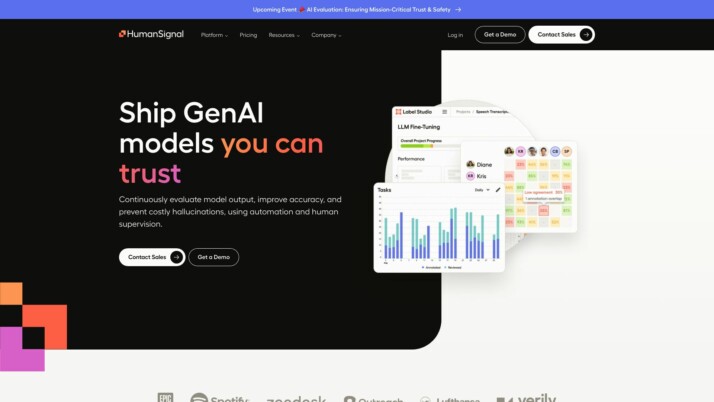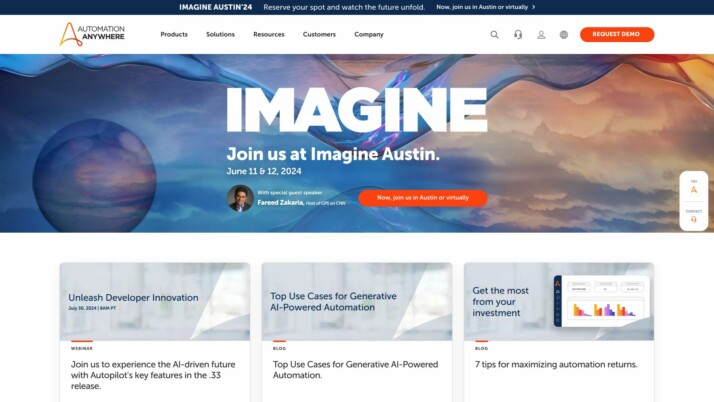Adala vs. Automation Anywhere: Key Feature Comparison
As the AI industry continues to experience unprecedented growth and innovation, the demand for powerful yet accessible tools to harness the potential of this revolutionary technology has never been greater. Whether you’re a developer, business leader, or AI enthusiast, finding the right solution to meet your specific needs is crucial.
In this comprehensive guide, we’ll explore two distinct platforms, Adala vs. Automation Anywhere, that offer unique capabilities to tackle a wide range of AI and automation challenges. From creating autonomous data labeling agents to streamlining business workflows through robotic process automation, we’ll delve into the key features, strengths, and potential use cases of each solution.
Adala Overview
Adala is an innovative open-source framework designed to create autonomous data labeling agents. These agents leverage large language models like GPT-3 to acquire specialized skills for tasks such as text classification, summarization, and question answering.
One of Adala’s core strengths is its ability to learn and continuously refine labeling skills through interactions with data and human feedback. The framework allows users to guide the training process by providing labeled ground truth datasets, ensuring the agents develop reliable capabilities tailored to specific needs.


Adala’s modular architecture encourages community contributions, fostering a collaborative ecosystem for skill development, runtime configurations, and dataset curation. This approach aims to increase the efficiency and reduce the costs associated with data labeling while maintaining high quality through human guidance and oversight.
Automation Anywhere Overview
Automation Anywhere is a leading provider of intelligent automation solutions that combine robotic process automation (RPA) capabilities with advanced analytics and AI. Their platform empowers businesses to automate repetitive computer-based tasks, identify opportunities for optimization, and drive operational efficiencies across the enterprise.
At the core of Automation Anywhere’s offering is a powerful visual bot builder that allows users to create software robots, or bots
, to mimic human actions and automate various processes. These bots can seamlessly integrate with a wide range of applications and systems, enabling organizations to streamline workflows and improve productivity.


Beyond traditional RPA, Automation Anywhere stands out for its advanced process discovery and analytics capabilities. By leveraging AI and machine learning, their platform can analyze existing processes, identify inefficiencies, and recommend areas for automation. This proactive approach empowers businesses to unlock new opportunities for optimization and drive continuous improvement.
Automation Anywhere’s platform can analyze existing processes, identify inefficiencies, and recommend areas for automation.
One of Automation Anywhere’s key strengths is its flexibility and scalability. With deployment options for on-premises, cloud, or hybrid environments, organizations can tailor the solution to their specific needs and infrastructure. Additionally, its robust control room functionality enables centralized bot deployment, monitoring, and management, ensuring seamless operation at scale.
Feature Comparison
Adala and Automation Anywhere are two distinct platforms that cater to different needs within the AI and automation landscape. While Adala is an open-source framework focused on creating autonomous data labeling agents, Automation Anywhere is a commercial robotic process automation (RPA) platform designed to streamline and optimize business workflows.
One of the most notable differences lies in their core functionalities. Adala’s agents specialize in acquiring and refining labeling skills through interactions with data and human feedback. This makes it particularly useful for tasks like text classification, summarization, and question answering. In contrast, Automation Anywhere’s bots are primarily geared towards mimicking human actions and automating repetitive computer-based tasks across various applications and systems.
Adala’s agents specialize in acquiring and refining labeling skills through interactions with data and human feedback.
Another key distinction is the level of autonomy and decision-making capabilities. Adala’s agents are designed to learn and improve their skills autonomously, iteratively developing their abilities based on environmental observations and human guidance. However, Automation Anywhere’s bots operate based on predefined rules and workflows, with limited capacity for autonomous learning or decision-making.
Adala’s modular architecture encourages community involvement and contributions, fostering an ecosystem for skill development and dataset curation. Automation Anywhere, on the other hand, takes a more traditional approach, offering a comprehensive suite of features tailored for enterprise-level process automation.
While Adala focuses primarily on text-based data processing, Automation Anywhere supports a wider range of data formats, including PDFs, Word documents, and images. This makes it a more versatile solution for automating tasks that involve diverse data types.
Automation Anywhere supports a wider range of data formats, including PDFs, Word documents, and images.
In terms of user experience, Adala is primarily code-based, requiring users to have programming skills to create and configure agents. Conversely, Automation Anywhere offers a visual bot builder, enabling users with less technical expertise to create and manage automation workflows.
Feature Comparison Table
| Adala | Automation Anywhere | SmythOS | |
|---|---|---|---|
| CORE FEATURES | |||
| Environments (Dev/Production) | ❌ | ✅ | ✅ |
| Visual Builder | ❌ | ✅ | ✅ |
| Debug Tools | ❌ | ❌ | ✅ |
| SECURITY | |||
| Data Encryption | ❌ | ❌ | ✅ |
| OAuth | ❌ | ✅ | ✅ |
| COMPONENTS | |||
| All other APIs/RPA | ❌ | ✅ | ✅ |
| DEPLOYMENT OPTIONS | |||
| Deploy as Scheduled Agent | ❌ | ✅ | ✅ |
| Scalability | ❌ | ✅ | ✅ |
| DATA LAKE SUPPORT | |||
| PDF Support | ❌ | ❌ | ✅ |
| Word .doc File Support | ❌ | ✅ | ✅ |
Best Alternative: SmythOS
While both Adala and Automation Anywhere offer valuable solutions in their respective domains, there’s an alternative platform that combines the best of both worlds and takes AI development to new heights: SmythOS.
SmythOS is a revolutionary AI platform that empowers users to create, deploy, and manage AI agents effortlessly. With its intuitive drag-and-drop interface, extensive integration ecosystem, and versatile deployment options, SmythOS streamlines the process of building and deploying AI workflows.
One of the standout features of SmythOS is its ability to support multi-agent orchestration, enabling teams of AI agents to collaborate seamlessly on complex tasks. This collaborative approach enhances efficiency and opens up new possibilities for tackling intricate challenges.
SmythOS provides a robust foundation for AI development, offering a wide range of pre-built API integrations, AI models, and ready-to-use templates. Users can accelerate their development process significantly, leveraging these resources to build sophisticated AI workflows with ease.
SmythOS combines the best of both worlds and takes AI development to new heights.
Moreover, SmythOS prioritizes security and scalability, ensuring that your AI agents can operate reliably and securely at any scale. With advanced encryption, OAuth support, and flexible deployment options, SmythOS provides a trusted environment for your AI initiatives.
Don’t just take our word for it – hear what our satisfied customers have to say about their experiences with SmythOS. From automating complex workflows to unlocking new insights, SmythOS has helped businesses across various industries achieve remarkable results.
Conclusion
In the rapidly evolving landscape of AI and automation, finding the right platform to meet your specific needs is crucial. While Adala excels in creating autonomous data labeling agents and Automation Anywhere offers robust RPA capabilities, SmythOS emerges as a game-changer, democratizing AI development and making it accessible to a broader audience.
With its intuitive interface, extensive integration ecosystem, and versatile deployment options, SmythOS empowers users to harness the full potential of AI across various use cases and industries. Whether you’re an enterprise seeking to automate processes, a developer looking to create cutting-edge AI applications, or an enthusiast eager to experiment with AI, SmythOS offers a comprehensive solution tailored to your needs.
SmythOS emerges as a game-changer, democratizing AI development and making it accessible to a broader audience.
To experience the future of AI development, we encourage you to explore the SmythOS platform today. Get started with your free account and unlock new frontiers in AI innovation. Visit our website to learn more about our offerings and pricing plans.
Last updated:
Disclaimer: The information presented in this article is for general informational purposes only and is provided as is. While we strive to keep the content up-to-date and accurate, we make no representations or warranties of any kind, express or implied, about the completeness, accuracy, reliability, suitability, or availability of the information contained in this article.
Any reliance you place on such information is strictly at your own risk. We reserve the right to make additions, deletions, or modifications to the contents of this article at any time without prior notice.
In no event will we be liable for any loss or damage including without limitation, indirect or consequential loss or damage, or any loss or damage whatsoever arising from loss of data, profits, or any other loss not specified herein arising out of, or in connection with, the use of this article.
Despite our best efforts, this article may contain oversights, errors, or omissions. If you notice any inaccuracies or have concerns about the content, please report them through our content feedback form. Your input helps us maintain the quality and reliability of our information.
